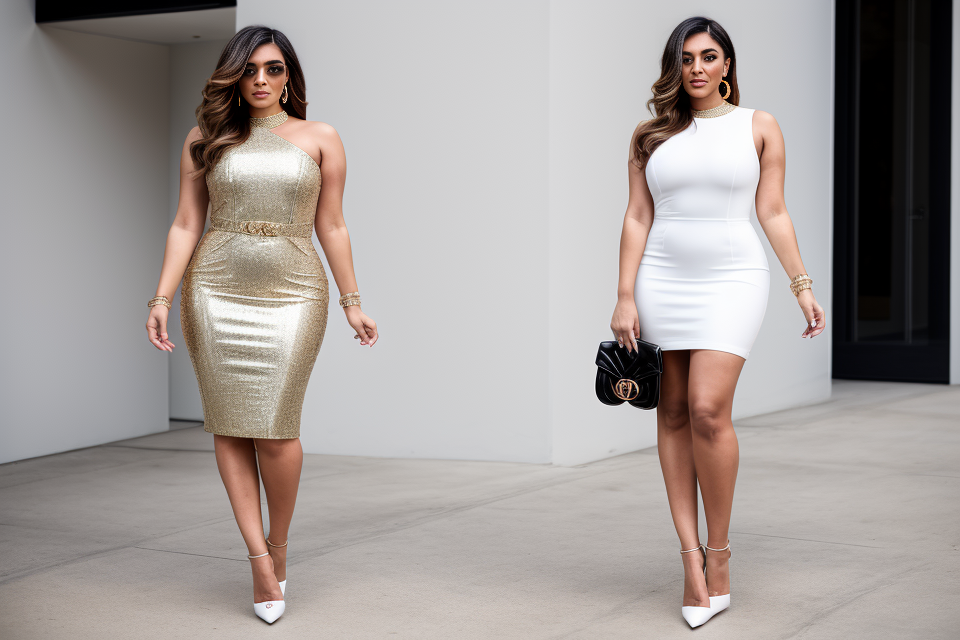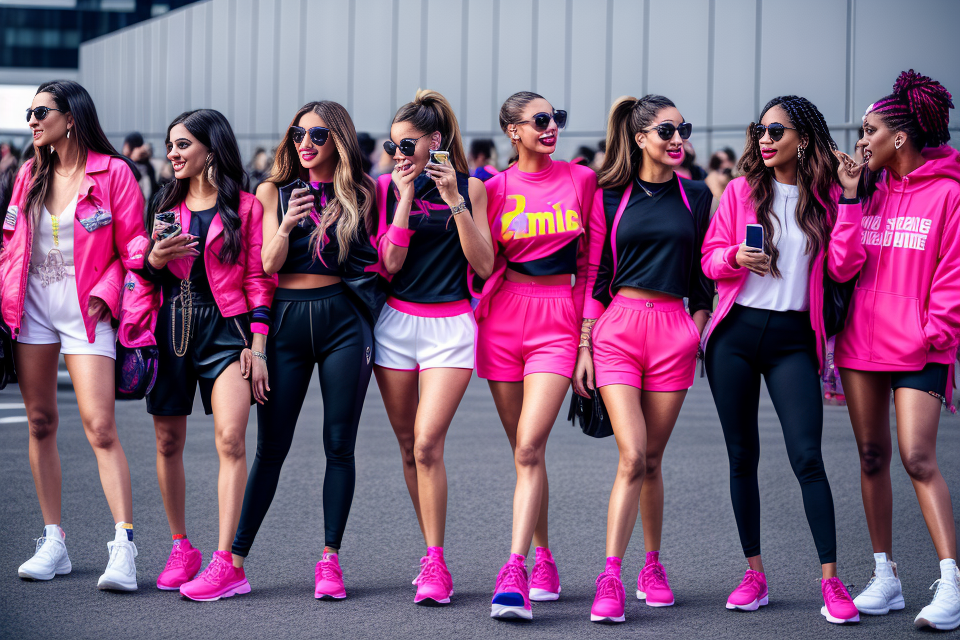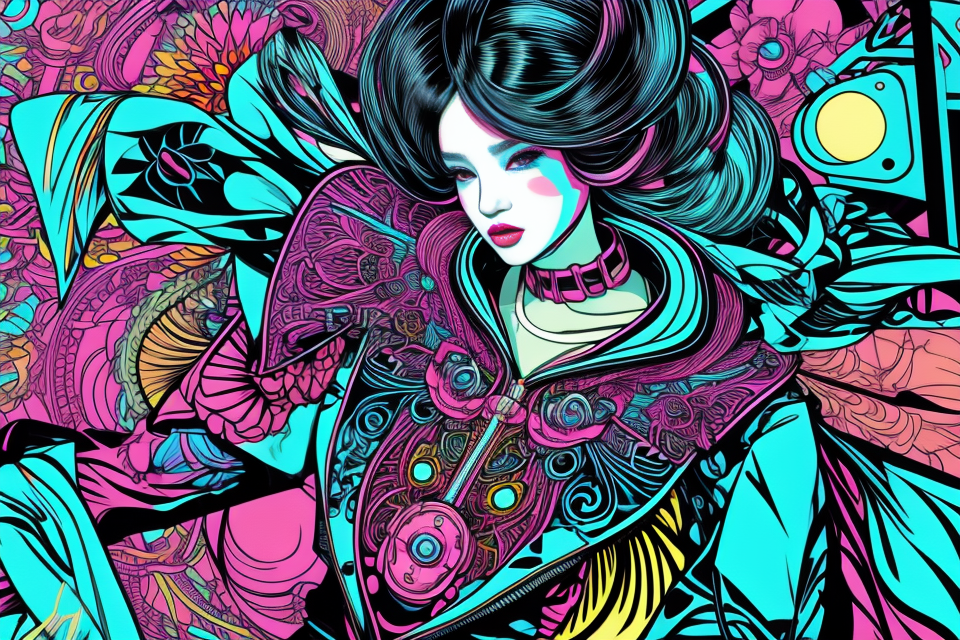The fashion industry has always been one of the most dynamic and ever-changing sectors. From haute couture to streetwear, fashion trends have continuously evolved, and so have the ways in which they are marketed and consumed. In recent years, the rise of social media influencers has had a profound impact on the fashion industry, changing the way fashion is marketed, consumed, and even created. In this article, we will explore how influencers have transformed the fashion industry and what this means for the future of fashion.
Influencers have greatly impacted the fashion industry by shaping trends and influencing consumer behavior. They have become a powerful force in the industry, with their opinions and endorsements carrying a significant amount of weight with their followers. This has led to a shift in the traditional power dynamics of the fashion industry, with brands now often relying on influencers to promote their products and create buzz around new launches. Additionally, influencers have also democratized the fashion industry by making it more accessible to a wider audience. They have exposed their followers to new styles and trends, and have given them the confidence to experiment with their own personal style. Overall, the rise of influencers has changed the way the fashion industry operates, and has had a significant impact on the way people consume and interact with fashion.
The Rise of Fashion Influencers
From Bloggers to Social Media Stars
In recent years, the fashion industry has witnessed a seismic shift in the way that trends are set and communicated to consumers. The rise of fashion influencers has transformed the landscape of the industry, providing a new avenue for designers and brands to showcase their products and reach a wider audience.
From Niche Bloggers to Instagram and TikTok Personalities
The evolution of fashion influencers has been swift and dramatic. In the early 2000s, fashion blogging emerged as a niche form of online content creation. These early bloggers, often stylish and fashion-obsessed individuals, began sharing their personal style and opinions on fashion through their websites.
Over time, as social media platforms like Instagram and TikTok gained popularity, the role of fashion influencers expanded and evolved. Today, the most successful fashion influencers have amassed massive followings on these platforms, leveraging their influence to promote brands and products to their audiences.
The Impact of Social Media on the Fashion Industry
The rise of fashion influencers has had a profound impact on the fashion industry as a whole. Traditional fashion magazines and newspapers, which once held sway over the industry, have seen their influence wane in the face of the social media revolution.
In their place, fashion influencers have emerged as the new tastemakers of the industry. Their opinions and recommendations carry significant weight with their followers, who often look to them for guidance on the latest trends and must-have products.
Moreover, the rise of fashion influencers has made the industry more accessible to a wider audience. No longer is fashion exclusive to a select few, as influencers have democratized the industry and made it possible for anyone with a smartphone and an internet connection to follow the latest trends and styles.
In conclusion, the rise of fashion influencers has transformed the fashion industry in ways that were once unimaginable. From niche bloggers to Instagram and TikTok personalities, these influencers have emerged as the new tastemakers of the industry, leveraging their influence to shape the way that we think about fashion and style.
The Power of Influence
The Influence of Fashion Influencers on Consumer Behavior
The power of fashion influencers is evident in their ability to influence consumer behavior. Influencers have become trusted sources of fashion advice and inspiration for their followers, who often look to them for guidance on what to wear and how to style their outfits. As a result, fashion influencers have a significant impact on the purchasing decisions of their followers, as they can endorse specific brands or products and drive sales through their recommendations.
How Influencers Shape Trends and Drive Sales
Influencers have also become a driving force behind the trends that shape the fashion industry. They have the power to make certain styles or products popular, and their endorsements can create a demand for particular items. Influencers can also help to establish new trends by showcasing new or innovative fashion items or styles, which can then be picked up by other designers and retailers. This influence on trends has made influencers an essential part of the fashion industry’s marketing strategy, as brands look to collaborate with influencers to promote their products and reach a wider audience.
The Role of Influencers in Shaping the Fashion Industry’s Direction
Finally, the power of fashion influencers extends to shaping the direction of the fashion industry as a whole. Influencers have become a significant force in shaping the conversation around fashion, and their opinions and recommendations carry weight within the industry. As a result, brands and designers are increasingly looking to influencers for feedback and input on their products and collections, and influencers are often invited to fashion shows and events as VIP guests. This influence on the industry has made fashion influencers an essential part of the fashion ecosystem, and their impact is likely to continue to grow in the future.
The Changing Landscape of Fashion
The Democratization of Fashion
In recent years, the fashion industry has undergone a significant transformation, with the rise of influencers playing a pivotal role in this change. The democratization of fashion, fueled by the power of social media, has allowed for a more inclusive and accessible landscape, shifting the focus from traditional fashion icons to everyday individuals.
- The rise of influencers as fashion tastemakers
- Influencers have become powerful figures in the fashion industry, with their opinions and choices carrying a significant impact on consumer behavior. They have taken the place of traditional fashion icons, such as celebrities and supermodels, by offering a more relatable and authentic perspective on fashion.
- Influencers’ reach extends far beyond the confines of fashion magazines and runway shows, as they interact directly with their followers on social media platforms. This has created a new avenue for brands to showcase their products and connect with their target audience.
- The impact of social media on fashion accessibility
- Social media has democratized the fashion industry by providing a platform for individuals to share their style and connect with others who share similar interests. This has fostered a sense of community and has given rise to niche fashion movements, such as sustainable fashion and plus-size fashion.
- Social media has also made fashion more accessible by providing instant access to a vast array of products and trends. Consumers can now easily discover and purchase items from all over the world, regardless of their geographic location.
- The rise of streetwear and athleisure
- Streetwear and athleisure have emerged as two of the most significant fashion trends of the past decade, and their rise can be attributed to the democratization of fashion. These styles were popularized by influencers and have since become mainstream, with many traditional fashion brands incorporating elements of streetwear and athleisure into their collections.
- The rise of streetwear and athleisure can also be attributed to their accessibility and versatility. These styles are often affordable and can be worn in a variety of settings, making them appealing to a wide range of consumers.
Overall, the democratization of fashion has transformed the landscape of the industry, making it more inclusive and accessible. Influencers have played a significant role in this transformation, leveraging the power of social media to share their perspectives and connect with their followers. As the fashion industry continues to evolve, it is clear that the influence of influencers will remain a significant force in shaping the future of fashion.
The Impact of Influencers on Traditional Fashion Brands
The rise of influencers has had a profound impact on traditional fashion brands. Once considered the arbiters of style and taste, fashion designers and brands now find themselves in a more collaborative relationship with influencers. This shift has led to a reevaluation of the role of traditional fashion brands and the way they approach marketing and promotion.
- The changing role of fashion designers and brands
Traditionally, fashion designers and brands have been the primary drivers of style and trends in the industry. They have dictated what is fashionable and what is not, and their designs have been heavily influenced by their own aesthetic vision. However, with the rise of influencers, fashion designers and brands have had to adapt to a new reality. Influencers have become a key part of the design process, offering insights into what their followers want and need, and providing valuable feedback on new designs.
As a result, fashion designers and brands have had to reevaluate their role in the industry. Instead of simply creating designs that reflect their own aesthetic vision, they must now take into account the preferences and opinions of influencers and their followers. This has led to a more collaborative approach to design, with influencers often playing an active role in the creative process.
- The impact of influencers on the fashion calendar and shows
The fashion calendar and shows have also been impacted by the rise of influencers. Traditionally, fashion shows have been the primary platform for designers to showcase their latest collections and connect with buyers and media. However, with the rise of social media, influencers have become a key part of the fashion show experience.
Influencers often attend fashion shows and provide live commentary on social media, sharing their thoughts and opinions on the latest designs. This has led to a shift in the way fashion shows are marketed and promoted, with brands now focused on creating experiences that will resonate with influencers and their followers.
- The blurring of lines between high fashion and streetwear
Finally, the rise of influencers has also led to a blurring of the lines between high fashion and streetwear. Influencers have played a key role in popularizing streetwear brands and styles, and have helped to break down the traditional barriers between high fashion and streetwear.
Traditionally, high fashion and streetwear have been considered distinct and separate styles, with high fashion often associated with luxury and exclusivity, and streetwear associated with urban and casual styles. However, with the rise of influencers, these distinctions have become less clear. Influencers have helped to popularize streetwear brands and styles, and have encouraged high fashion brands to incorporate more casual and urban elements into their designs.
Overall, the rise of influencers has had a significant impact on traditional fashion brands. By providing valuable insights into consumer preferences and offering a new platform for promotion and marketing, influencers have helped to reshape the fashion industry and create a more collaborative and inclusive approach to design.
The Future of Fashion Influencers
The Evolution of Influencer Marketing
- The future of influencer marketing in the fashion industry
- Influencer marketing is expected to continue to play a significant role in the fashion industry, with brands expected to invest more in influencer marketing campaigns.
- Brands are expected to increasingly collaborate with micro-influencers and nano-influencers, who have smaller followings but are often more influential within their niche communities.
- Augmented reality and virtual reality technologies are expected to become more prevalent in influencer marketing campaigns, allowing brands to create immersive experiences for consumers.
- The impact of influencer marketing on sustainability and ethical fashion
- Influencer marketing has played a significant role in raising awareness about sustainability and ethical fashion issues.
- Influencers have used their platforms to promote sustainable and ethical fashion brands, and to encourage consumers to make more conscious purchasing decisions.
- However, there is still room for improvement, as some influencers have been criticized for promoting unsustainable and unethical fashion brands.
- The role of micro-influencers and nano-influencers
- Micro-influencers and nano-influencers have gained significant influence in recent years, as consumers have become more interested in authentic and relatable content.
- Brands are increasingly partnering with micro-influencers and nano-influencers for more targeted and effective marketing campaigns.
- However, there is a risk of over-saturation, as the market becomes increasingly crowded with influencers of all sizes.
The Future of Fashion Itself
The Impact of Influencers on the Future of Fashion
- Influencers have become an integral part of the fashion industry, shaping trends and influencing consumer behavior.
- As influencers continue to gain popularity, their impact on the fashion industry is likely to increase, with the potential to reshape the industry as a whole.
- Influencers have the power to make or break a fashion trend, and their opinions and recommendations carry significant weight with their followers.
The Role of Influencers in Shaping the Future of Sustainable and Ethical Fashion
- Sustainable and ethical fashion has gained significant traction in recent years, with consumers becoming increasingly conscious of the environmental and social impact of their purchases.
- Influencers have played a crucial role in raising awareness about sustainable and ethical fashion, highlighting the importance of eco-friendly and socially responsible practices in the industry.
- By promoting sustainable and ethical brands and products, influencers have the potential to drive the growth of this market and encourage more sustainable practices within the fashion industry as a whole.
The Potential for New and Emerging Fashion Trends
- Influencers have the ability to introduce new and emerging fashion trends to a wider audience, potentially driving the growth of niche markets and bringing new styles and ideas to the forefront of the industry.
- As influencers continue to push the boundaries of fashion and challenge traditional norms, they have the potential to spark new trends and shape the direction of the fashion industry in previously unimaginable ways.
- The power of influencers to drive trends and shape consumer behavior means that they will likely play a crucial role in shaping the future of fashion itself, with the potential to reshape the industry in exciting and unexpected ways.
FAQs
1. How have influencers changed the fashion industry?
The rise of social media influencers has had a significant impact on the fashion industry. Influencers have become a powerful force in shaping public opinion and trends, particularly among younger consumers. They have the ability to make or break a fashion trend or brand, and their endorsements and recommendations carry a lot of weight with their followers. This has given influencers a lot of power in the fashion industry, and many brands now work closely with influencers to promote their products and reach new audiences.
2. How do influencers affect fashion trends?
Influencers have a huge influence on fashion trends. They often set the tone for what is popular and what is not, and their followers often take their lead when it comes to fashion choices. Influencers also have the power to make or break a trend, and many brands will jump on a trend if they see an influencer promoting it. This means that influencers have a lot of power in shaping the direction of the fashion industry, and many brands now rely on them to help drive sales and stay relevant.
3. How do brands work with influencers?
Many brands now work with influencers to promote their products and reach new audiences. This can take many forms, from sponsored posts on social media to collaborations on fashion campaigns. Brands may also provide influencers with free products in exchange for mentions or posts, or pay them to attend events or appear in campaigns. The goal for brands is to leverage the influence of the influencer to reach a wider audience and build brand awareness.
4. What are the benefits of working with influencers for brands?
There are many benefits to working with influencers for brands. Influencers have a large and engaged following, which can help brands reach a wider audience and build brand awareness. They also have the ability to make or break a trend, which can be valuable for brands looking to stay relevant and on-trend. Additionally, working with influencers can help brands appeal to younger consumers, who are often more likely to trust the opinions of influencers than traditional advertising.
5. How have influencers changed the way we shop for fashion?
Influencers have changed the way we shop for fashion in a number of ways. They have made it easier for consumers to discover new brands and products, and have given consumers more confidence in making purchasing decisions. Influencers have also made it easier for consumers to stay on-trend and up-to-date with the latest fashion trends. Many consumers now turn to influencers for fashion advice and inspiration, rather than traditional fashion magazines or advertising.



